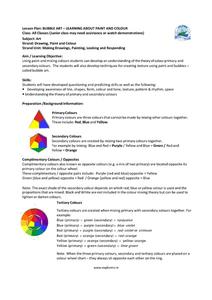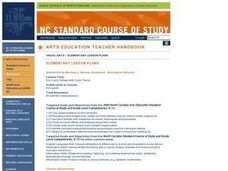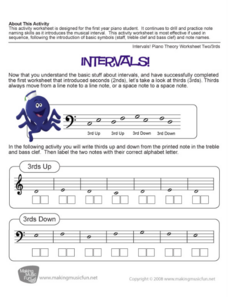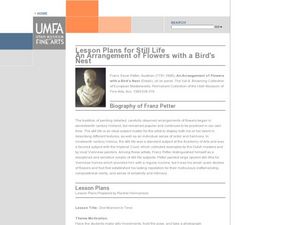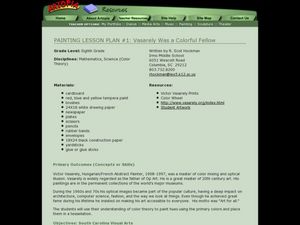Curated OER
Color Theory & Using Layers
Students investigate the color wheel theory and incorporate it into simple sketches on their handheld. The importance of the use of layering and the difference between primary, secondary, and tertiary colors is presented in this lesson.
National Gallery of Canada
Mastering One-Point Perspective
Cover one-point perspective through observation and practice. Class members examine several works of art that use one-point perspective, look at magazine images to find the vanishing points and horizon lines, and draw their own city...
Marine Institute
Bubble Art – Learning About Paint and Color
To gain an understanding of color mixing theory and the color wheel, young artists draw a picture, mix up a batch of secondary colors to which they add dish soap, and using straws, bubble up the paint....
Music Teaching Resources
Note Naming Worksheet 1
Can you name this note? Young musicians are asked to name each of the notes pictured on a music worksheet and then to place these notes on a staff.
Curated OER
Eric Carle Collage with Color Theory
Second graders analyze color theory and collage techniques through the creation of collages in the style of artist/author Eric Carle. Color experiments and may hands-on section allow this lesson to be very informative and fun for the...
Fun Music Company
The Harmonic Minor Scale
The harmonic minor scale, including the use of accidentals, is the focus of a one-page learning exercise that includes instructional information and practice exercises.
Fun Music Company
Writing Major Scales
Designed as an assessment of understanding, this one-page worksheet asks musicians to demonstrate their understanding of scales by drawing C, G, and F Major scales on the provided staffs.
Fun Music Company
Working Out the Key
"Gimme an E minor!" Or any key for that matter. But how do you figure out the key of a piece of music? Here's a worksheet that shows young musicians three easy steps to help them identify the key of a piece of music.
Fun Music Company
Classification of Intervals
Major 2nd, Perfect 4th, Minor 3rd. The number and classification of intervals are the focus of a one-page worksheet that asks musicians to write the intervals above given notes and to indicate the classification of others.
Fun Music Company
Treasure Island Clues
In order to answer a music trivia question, young musicians must count the number of ties in a melody, name the final note, and use these clues to spell out Charlie Parker's nickname. This activity is not for the birds.
Fun Music Company
Bat Trails: Music Symbols
Whether written for Therese, Elisabeth, or for Juliane, young music theory students will enjoy pursuing the clues hidden in music symbols that indicate who wrote "Fur Elise."
Fun Music Company
Treasure Island Clues: Scales
Which Beatle received the most fan mail? To answer this music trivia question, young musicians must employ their knowledge of scales, key signatures, and leading notes to find the letters that spell out the name of one of the famous mop...
MakingMusicFun.net
Intervals! (Thirds) | Free Music Theory Worksheet (Digital Print)
For this music learning exercise, learners work with thirds as intervals in sheet music. They write thirds up and down before labeling the notes with their correct alphabet letter. They complete two examples.
Fun Music Company
Treasure Island Clues: Intervals
You may know about A, B, and C, but now you can include "arrrrr" to the list of music notes to practice! Here is a fun pirate-themed activity in which young musicians determine the intervals of various notes in the treble...
Curated OER
An Approach to Chemistry via the Analysis of Art Objects: The Scientific Method, Laboratory Safety, Light and Color Theory
Students create a painting that clearly exemplifies the use of primary pigments to make secondary pigments. They demonstrate the distinction between value and saturation. They explain the affect of adjacent colors on each other and...
Fun Music Company
Completing Measures with Rests
Rests. Eighth rests, quarter rests, and half rests are the focus of a one-page worksheet that asks music theory students to complete a series of measures with rests and bar lines.
Curated OER
Middle School General Music Unit Plans
Here's a collection of unit plans for middle school musicians. Topics include the mbira, opera, rhythm and culture, music in Africa, music in the movies, music theory and notation, blues and jazz, and the ocarina. Definitely worth a look.
Curated OER
Music Theories
Explore the inception and evolution of hip-hop music as a springboard for writing music reviews and researching other genres of music. Learners will read and discuss the Times' article, From Underground Music to Fashion Statement to then...
Fun Music Company
Treasure Island Clues: Rhythm
Designed for rhythm level 1, the two games in this packet ask young musicians to identify the number of beats represented by a series of notes and notations, and then to use those numbers to answer a music trivia question.
Curated OER
One Moment in Time
Students discuss the Mimetic theory and design a still life design in linoleum block. For this Mimetic theory lesson, students discuss the importance of realism in art and research Greek and Roman art forms from which the Mimetic...
Curated OER
Pitch, Intonation, Harmonic Theory
Students listen to pitches and determine if they are in tune, flat or sharp. Using Aurelia computer software and playing as a band, students practice pitch theory, and play two-octave major scales. They practice and discuss how to tune...
Curated OER
Vasarely Was A Colorful Fellow
Eighth graders create artwork inspired by the work of Victor Vasarely. For this op art lesson, 8th graders explore color theory and color mixing. Students create ten shapes to use in their artwork and over the course of two weeks,...
Curated OER
Nuclear Scientists Project
Young scholars explore nuclear scientists. In this nuclear science research lesson, students choose a scientist who has contributed to nuclear theory, research his/her life and accomplishments, and write a paper. Young scholars...
Curated OER
Not Your Grandma's Music: A Lesson in Music History
Students experience and discuss the different musical periods such as Baroque, Classical and Romantic. In this music lesson, students discover musical theory and apply it to the Baroque, Classical, and Romantic periods. Students will...


